|
Readers are reminded that all book reviews are the opinion of our guest reviewers and not necessarily those of Selfishgenie Publishing. 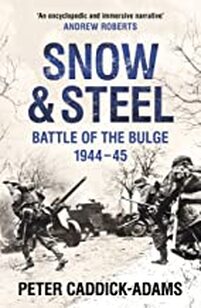 Like many of my generation, I learned a lot of my World War II history not in the classroom or from non-fiction books, but in the cinema. I now realise that was a great mistake, because those films were made for entertainment and are therefore over-simplified. They are also often embellished, which is worse because the true stories are usually dramatic enough not to require embellishment. Take “The Battle Of The Bulge” for example. While the film is based around factual events and does feature some of them in its plot, such as Nazis dressing in US Army uniforms as a deception, it then descends into an over-simplified race to gain access to Allied fuel stocks to keep the German tanks on the road. Even the scenery isn’t authentic as the tank battles are filmed on flat ground in a less than chilly Spain, so the snow that is present in the early part of the film is missing in many later scenes (something I didn’t pick up on in my youth). While that is one feature of the battle – the Germans were very short of fuel – it isn’t the main reason why the battle was lost. And it certainly wasn’t the reason the battle was fought in the first place. 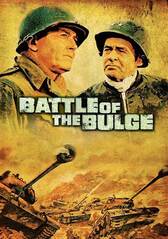 The film's poster, featuring Robert Ryan (right) as Lt Gen Grey and Henry Fonda as Lt Col Dan Kiley. The film's poster, featuring Robert Ryan (right) as Lt Gen Grey and Henry Fonda as Lt Col Dan Kiley. The film also forgets some of the main features of the battle, which were the intense cold, the appalling condition of the roads and the incredibly challenging terrain over which the battle was fought: thick pine forest, steep hills and criss-crossed by rivers with vulnerable bridges. All of that contributed to the loss of the battle. The modern road network disguises the fact that many of the roads in 1944 were little more than muddy tracks, which tank tracks churned into a freezing swamp. But the main reason for the Germans losing the battle, in my humble opinion, was the incredible heroism shown by the American soldiers involved and the flexibility of the Allied commanders in directing forces to the places where they could best fight the enemy. While the film displays this in cameo with the resistance of the 101st Airborne Division at Bastogne, it is only a tiny fraction of the story. 20 men were awarded the Congressional Medal of Honour for the battle, compared to the 16 that were awarded for D-Day. Only 473 were awarded for the entire Second World War. 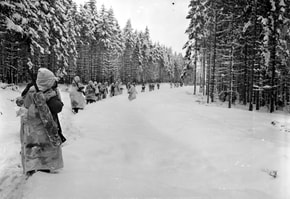 Soldiers of the 82nd Airborne Division outside Bastogne. Soldiers of the 82nd Airborne Division outside Bastogne. One of the things the film doesn’t show, for example, was that the 101st Airborne had to be transported over 100 miles to Bastogne standing up in the back of trucks with no protection from the freezing weather. They then had to start fighting as soon as they arrived. They weren’t the only troops to undergo such an ordeal, I use them only for the purposes of illustration. Many soldiers had been on leave in Luxembourg city or Paris and ended up fighting while still wearing their dress uniforms. Several of the Allied commanders were also on leave or absent from their posts for other reasons. So thin were the Allied defences in places that the cooks, clerks and mechanics found themselves fighting in the front line.  The author, Peter Caddick-Adams Phd The author, Peter Caddick-Adams Phd Which brings me to the book, “Snow And Steel” by Peter Caddick-Adams. My current series of novels is set during World War II and part of one of my plots makes reference to the Battle of the Bulge, which took place from mid-December 1944 to mid-January 1945. The plot doesn’t involve the battle directly, but as it is mentioned I thought I had better make sure I understood the context so that I could better write the plot for my own book. I follow the author, Peter Caddick-Adams, on Twitter because we share a common interest in military history and World War II in particular. I had seen the occasional “plug” for this book, which was his latest work, so I thought “Why not? I need to know more about the battle, he’s written a book about the battle, so let’s give it a go.” Firstly, a little bit about the author. He holds an Honours degree in wars studies, attended the Royal Military Academy, Sandhurst, served as a soldier in the Balkans, Iraq and Afghanistan and now lectures in Military and Security Studies at the British Defence Academy, as well as writing books about Second World War battles. So, we can safely say he knows what he’s talking about, which is a good start. 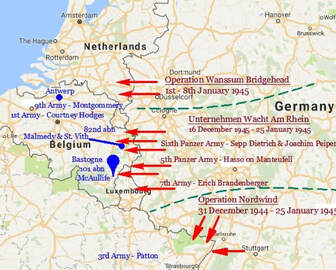 The battleground 1944 The battleground 1944 The most important part of understanding any battle is understanding the reason it is being fought. Why fight there? What did the attackers hope to achieve? Without understanding what the battle was about, you can’t know if it was a success or a failure. Yes, one side won and the other side lost, but did the winners achieve their goals? What were the consequences of losing? Was the sacrifice worth what it achieved? That is why the film of the Battle of the Bulge is so disappointing in historic terms, because it wasn’t about grabbing fuel for tanks, it was about turning the war around and pushing the Allies back to the sea, just as the Germans had in 1940. And that is where this book starts. Why was the battle being fought? 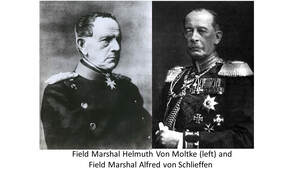 The Germans were using the same basic plan as had been used in 1914, which was the Schlieffen-Moltke plan, named after its Prussian creators when they devised it at the end of the 19th century. The plan involved a major offensive through the Ardennes Forest in Belgium and Luxembourg to strike into France where its defences were weakest. In 1914 it almost worked and in 1940 the same basic plan was used again and this time, using a combination of modern weaponry and speed, it did work. In December 1944 the aim was to strike through Luxembourg and Belgium to Antwerp, re-capture the strategically important port while, at the same time, splitting the British from their American allies so that the two forces could be defeated independently. Had the plan worked it might not have ended the war in Europe, giving the Germans a victory, but it would certainly have delayed the end of the war by many more months, possibly even years. And, of course, with the Allies defeated or delayed in the west it would allow Hitler to concentrate his forces once again to defeat Russia in the east.  German Panther V tanks advance through a Belgian village. German Panther V tanks advance through a Belgian village. The author then takes us into the minds of the commanders on the two sides. What they thought of the plan, what their mental state was in general after 5 years of war and what the political background was like. That was particularly important on the German side because by that time Hitler was directing the war almost single handed, ignoring or not seeking the advice of his military commanders. It was also important on the Allied side, where the Allied commander, General Eisenhower, was able to operate free of political interference. We then take a look at the military preparedness of both sides in the weeks and days preceding the battle. In order to assemble enough troops for the attack, the Germans had to strip both the Luftwaffe and the Kriegsmarine of men and draft into the army teenage boys, middle-aged men and some former soldiers who had already been discharged because of wounds sustained in earlier battles. It might be thought that these make-shift troops would prove to be a weak link in the plan, but they were surprisingly effective in the early days of the battle. 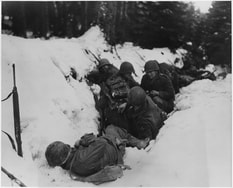 American troops take cover during a German attack American troops take cover during a German attack As well as the Volksgrenadiers (people’s grenadiers, the name given by Heinrich Himmler, who was responsible for their recruitment) there were the more seasoned troops of the German army and the SS and they provided all of the tank units that were used, as well as most of the artillery. The author provides a lot of detail about these men, having interviewed several of them. He provides similar amounts of detail for the Allied troops. On the other side, the Allies weren't prepared for a winter war. After the euphoria of D-Day and the liberation of France, the war was supposed to be over by Christmas. The Allies weren't equipped for one of the worst winters on record. Many of the casualties suffered weren't the result of combat, they were the result of the weather: hypothermia, frost bite and trench foot. Many American soldiers just froze to death. Once the battle starts the author takes us through what happened on the various axes of the German advance, telling us about the men who fought and the terrain over which the battle was conducted. He has visited a lot of it and provides some interesting details of what he has found while walking over the ground. His military eye is able to pick out details that a civilian would probably not notice. Readers who have a mind to do so, could pick up some interesting souvenirs should they ever visit the area. 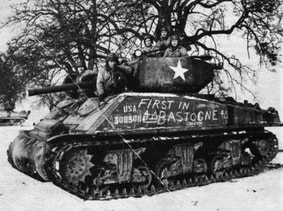 An American Sherman tank at Bastogne. An American Sherman tank at Bastogne. Admittedly this is a bit of a niche subject and won’t be of much interest to some readers. It was also an American battle for the most part, so may not be of much interest to British readers, though there was some British involvement; General Montgomery was given command of the American forces at the northern end of the battlefield, and British troops did fight in some engagements. But the book is aimed at people with an interest in military history and World War II in particular. For those readers I thoroughly recommend “Snow and Steel” by Peter Caddick-Adams. To find out more about the book, click on the cover image at the top of this review. If you have found this blog interesting or informative, why not sign up for our newsletter to get more book recommendations. Just click the button below. Would you like to be a guest reviewer for the Selfishgenie Publishing blog? Contact us with details of the book you'd like to review. Just three rules:
0 Comments
 Following on from last week’s blog about literary figures insulting each other, I received quite a few emails giving examples of more general insults. So many, in fact, that I have decided to do a blog just on them. First of all, some of these may be quotes from the writings or speeches of other people, living or dead, so I beg forgiveness from those whose words I have used without giving them the usual citations and credit. However, so many of these are now going around the internet that they almost fall into the category of “public domain” – even if they don’t fit the legal definition of that phrase. So, be flattered that your words have found such fame. But my thanks to all my readers who have taken the time to send these in. Without you I would have had to apply some original thought to write this week’s blog and that would have made my head hurt. I’ve tried to place all of these into categories, but some would fit into more than one and some don’t fit anywhere, so I’ve included them under “miscellaneous”.  Appearance
You’re not ugly, you’re just someone it’s hard to look at. You’re so fat, people jog around you for exercise. (I could have done a whole blog on fat jokes alone, but this is my favourite). I’m not saying you’re ugly. It's just that you're 8 beers away from being my type. Who gave you that haircut? Do you want me and the boys to go around and beat him up? Mirrors can’t talk. Lucky for you they can’t laugh either. Halloween finished yesterday, so you can take your mask off now. You are living proof that there is no God, because God is supposed to have created mankind in his own image and no one would worship a face like yours. Everyone has the right to be ugly, but you abuse the privilege.  Dress sense I’m sorry, were we supposed to dress stupid today? I know that sometimes fashions come back around a second time, but you won’t see that style again until the next time Halley’s comet appears. I know your look is supposed to be ‘old school’ but schools were never that old. You do know that this office doesn’t have a “dress down Friday”, don’t you? Besides, which, it’s Monday. Wurzel Gummage was on the phone. He asked if he could have his suit back. I see you had another power cut while you were getting dressed. I didn’t realise you were so brave until I saw what you were wearing.  Ego NASA called; they asked you to step to one side because your ego is blocking out the Hubble telescope. It’s been several centuries since they discovered that the world revolves around the Sun and not around you. NASA called. They’ve finally built a rocket big enough to match your ego. Your biggest fan is the one on the ceiling. Do I think you’re clever? I’m sorry, but my mother taught me not to lie. If you were as great as you think you are, someone else would have noticed by now. You are the very definition of “Z List celebrity”. Do I know who you are? Of course I do. But I have to serve you or 'll get lose my job. 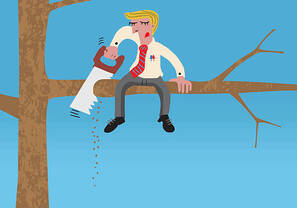 Intelligence I’m surprised at your level of stupidity. If stupidity was a currency, you would be a billionaire. Of course I talk like an idiot. How else could you understand me? Your head is just there to keep your ears apart. I can explain it to you, but I can’t understand it for you. Fools are temporary, but stupidity like yours is forever. If brains were dynamite, you wouldn’t have enough to blow your hat off. Somewhere out there is a village that’s lost its idiot. I’d have to have my head amputated before my IQ would be as low as yours. Without stupidity, there would be no way of recognising intelligence, so in that sense you are important. It’s always been said that two heads are better than one, but not when one of them is yours. It’s the university on the phone. They’re trying to find out how long a human can live without a brain and want to know how old you are. Quick, stand next to me. I need to look good and next to you I look like a genius. I used to say “please engage brain before speaking”. Then I met you. Now I say “please engage brain before thinking”. It’s a good job that stupidity isn’t a crime or you would be serving a life sentence. I’ve just realised that you aren’t as stupid as you sound. No one could be that stupid and still be capable of breathing. Miscellaneous Please don’t interrupt me when I’m ignoring you. Allowing you to survive childbirth was medical malpractice. I’d slap you, but that would be animal abuse. How can I insult you? Nature has done such a great job already. Do you still love nature, despite what it did to you? I went looking for your family tree and it turned out to be a bonsai. My door is always open, so feel free to leave anytime now. Of course I’ve got time to see you. How about 30th February? Be kinder to your parents. Don’t go home so often. I've researched your family crest. Apparently it's an anchor with the letter W above it. 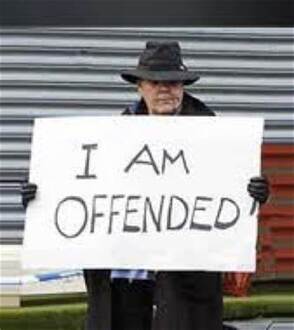 Offence (the taking of) You find it offensive? I find it funny. That’s why I’m happier than you. You only feel offended because what they said applied to you. Honestly, I didn’t mean to cause offence. That was just a happy accident. (Best read in a Yoda voice) Cause offence did I? Don’t care a bit do I. I will defend to the death your right to be offended if you will defend to the death my right to cause offence. No, I wasn’t offended. He was right, I am a stupid idiot. And you are an even bigger idiot for not knowing that. 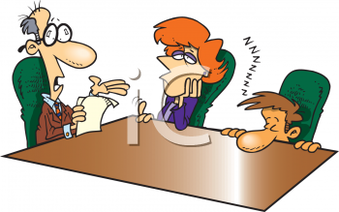 Personality I won’t say you are shallow but compared to you a puddle has hidden depths. Life is good, you should get one. You are an oxygen thief. You are a waste of good skin. I’d like to say it’s been a pleasure meeting you, but I’d be lying. I’ve just discovered that there is a God. I asked him to punish me and then you turned up. Compared to hearing one of your stories, the ticking of a clock is an entertainment. With all the wonders of technology: photoshop, auto-tune, plastic surgery, it’s such a pity that there’s nothing it can do to improve your personality. You have given a whole new meaning to the expression “sour grapes”. You are the photoshop of truth telling. Yes, you can help me solve my problem. Go away. Being here with you makes me want to go to the dentist. It will be so much more fun. That wasn’t a round of applause, that was just everyone slapping their own faces trying to stay awake while they listened to you. 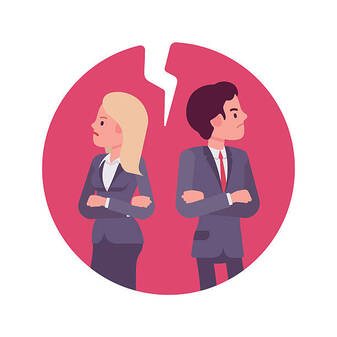 Relationships. My phone battery lasts longer than your relationships. You deserve someone like you. You two deserve more credit. Thanks to you, two other people are living happier lives with someone else. I’d say you had bad taste in men, but then again, in life you get what you deserve. Sleeping around isn’t classed as a hobby. Relationships aren’t like shopping. You don’t get a bigger discount the more people you sleep with. When I asked the name of your last sexual partner, I didn’t expect the name of a football team. And finally If you are the sort of person who enjoys insulting others, just remember that what goes around, come around. And if your favourite insult isn’t amongst the ones above, please feel free to send it to me and it may appear in a future blog. if you have found this blog interesting or informative, make sure you don't miss future editions by signing up for our newsletter by clicking the button below. We promise not to spam you and you can unsubscribe at any time. 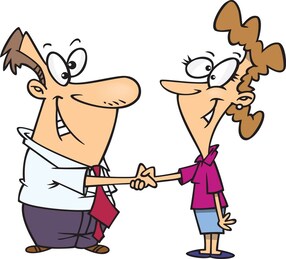 Mutual support Mutual support To see the way that authors support each other on social media (for the most part) it would be easy to think that things have always been that cordial in the writing fraternity. Sadly, they have not. In the past it was quite common for authors to insult each other. Even in quite recent history there has been the odd barbed comment. Now, I must make it clear that I am not advocating a return to such uncivilised behaviour. But a good insult, delivered with wit, can be a source of humour. 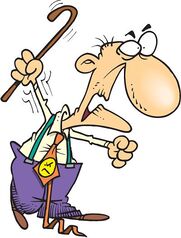 An Ancient Greek being insulting An Ancient Greek being insulting While there is evidence that goes all the way back to Ancient Greece, when playwrights used to insult each other’s works, they tend to become more witty as we get closer to modern times. Shakespeare is now a revered literary figure throughout the world, but it wasn’t always so. In his own time he came in for a fair share of insults. Fellow playwright Ben Johnson once said of the Bard of Avon “I remember, the players have often mentioned it as an honour to Shakespeare that in his writing (whatsoever he penned) he never blotted out a line. My answer hath been, would he had blotted a thousand.” OK, it’s not quite up there with “Your Momma” but it’s quite a damning criticism. 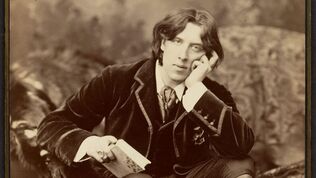 Irish poet and playwright Oscar Wilde, thinking up new insults. Irish poet and playwright Oscar Wilde, thinking up new insults. Oscar Wilde is well known for his caustic wit. After spending time “at Her Majesty’s pleasure” as a guest at Reading high security hotel (prison) he commented “If this is the way Queen Victoria treats her prisoners, she doesn’t deserve to have any”. However, that is beside the point. On writing and writers Wilde had a lot to say. This one probably holds good today. “In olden days, books were written by men of letters and read by the public. Nowadays books are written by the public and read by no one.” If you are an author and are having trouble getting readers, Oscar Wilder foresaw your pain. 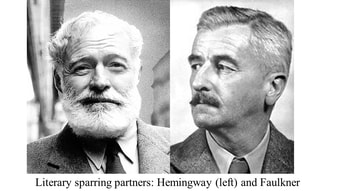 Over the years there have been some great rivalries in literature and the rivals didn’t always play nicely. William Faulkner was accused by Ernest Hemingway of being under the influence of alcohol while he wrote. He said “I can tell right in the middle of a page when he’s had his first one.” Given Hemingway’s own reputation as an imbiber, that may be seen as a pot-and-kettle sort of remark. In retaliation Faulkner quipped. “He has never been known to use a word that might send a reader to the dictionary.” Personally, I’d find that a recommendation. When I’m reading, I don’t want to have to keep looking up words to find out what the author is talking about. But maybe that’s just me. But in return for that slight, Hemingway came back with “Poor Faulkner. Does he really think big emotions come from big words?” Hemingway seems to have attracted a lot of criticism from fellow writers. In 1972 Victor Nabokov said, “As to Hemingway, I read him for the first time in the early ‘forties, something about bells, balls and bulls, and loathed it.” I was always taught not to speak ill of the dead and Hemingway died in 1961, so he didn’t even get the right of reply.  Lord Byron, who should be careful of whom he insults if he's going to dress like that! Lord Byron, who should be careful of whom he insults if he's going to dress like that! Two great rivals of late 18th and early 19th century poetry were Lord Byron and John Keats. I think it was true to say that Byron wasn’t exactly an admirer of Keats, if this quote is anything to go by: “Here are Johnny Keats’ piss-a-bed poetry, and three novels by God knows whom… No more Keats, I entreat: flay him alive; if some of you don’t I must skin him myself: there is no bearing the drivelling idiotism of the Mankin.” Ouch.  A victim of misogyny? Jane Austen A victim of misogyny? Jane Austen Male authors aren’t always gentlemen. In an era when it was considered a great social gaff to insult a woman, Ralph Waldo Emerson said of Jane Austen’s writing “Miss Austen’s novels . . . seem to me vulgar in tone, sterile in artistic invention, imprisoned in the wretched conventions of English society, without genius, wit, or knowledge of the world. Never was life so pinched and narrow. The one problem in the mind of the writer . . . is marriageableness.” But he wasn’t the only one to be critical of Austen. Mark Twain, never a shrinking violet, said of her work “I haven’t any right to criticize books, and I don’t do it except when I hate them. I often want to criticize Jane Austen, but her books madden me so that I can’t conceal my frenzy from the reader; and therefore I have to stop every time I begin. Every time I read ‘Pride and Prejudice,’ I want to dig her up and hit her over the skull with her own shin-bone.” 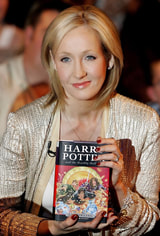 J K Rowling J K Rowling And things haven’t changed much since. Harold Bloom proved himself to be quite ungentlemanly when he said of J K Rowling “How to read ‘Harry Potter and the Sorcerer’s Stone’? Why, very quickly, to begin with, and perhaps also to make an end. Why read it? Presumably, if you cannot be persuaded to read anything better, Rowling will have to do.” Bearing in mind that Rowling aimed her books at younger readers, that was a trifle harsh coming from an adult. Bloom was about 70 then, so a little old for Harry Potter I would have thought. Sometimes these things can form chains. Gore Vidal said of Truman Capote “He’s a full-fledged housewife from Kansas with all the prejudices.” While Capote said of Jack Kerouac “That’s not writing, that’s typing.” 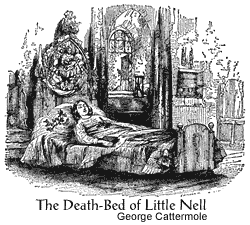 But for my final literary insult I return to the daddy of them all, Oscar Wilde, Having read The Old Curiosity Shop, by Charles Dickens, Wilde offered this opinion: “One must have a heart of stone to read the death of Little Nell without laughing.” I wish you better criticism than that, and for my closing quotes I’ll return firstly to Ernest Hemingway, “Critics are men who watch a battle from on high and then come down and shoot the survivors”.  Constructive criticism Constructive criticism And secondly to Brendan Behan: “Critics are like eunuchs in a harem: they know how it’s done, they’ve seen it done every day, but they’re unable to do it themselves” Just remember that last one the next time you get a less than fulsome review. And if you are going to be critical of another author's work, at least try to make it witty. Who knows - you might even be quoted in a blog like this. If you have found this blog interesting or informative and you would like to make sure you don't miss future editions, why not sign up for our newsletter? Just click the button below. We promise not to spam you and you can unsubscribe at any time.  You’ve written this great book, but you can’t seem to capture the interest of an agent or publisher. You’ve sent it to every agent and every publisher in the listings, but all you get back is rejections and sometimes not even that. How long does this go on for before you ask yourself “Is it me?” On the other hand, you may feel that your work isn’t good enough for publication, so you may not have submitted it to an agent or publisher because you think it will be rejected. Why might you feel that way? Let me introduce you to the Dunning-Kruger effect.  Stupid people don't know they are stupid! Stupid people don't know they are stupid! This is a hypothesis in social psychology postulating that people of lower capability don’t know their capabilities are low, while people of higher capability don’t always realise how capable they are. This has sometimes been unfairly paraphrased as “stupid people don’t know they are stupid” and, of course, the opposite of that is that clever people sometimes don’t realise how clever they are. I have to say up front that there are critics of the hypothesis. Firstly, in some cultures there is great emphasis placed on modesty, so a clever person would never claim to be cleverer than someone else, because that would be immodest. Similarly, in some cultures it is considered rude to criticize others, so honest feedback on poor performance isn’t always provided. The other flaw is that the studies that were carried out to test the hypothesis used psychology students as the subjects and they aren’t representative of society as a whole. But leaving aside those criticisms, there is consistently strong evidence that the Dunning -Kruger effect is real . But what do we know about it?  David Dunning and Justin Kruger are the two American psychologists that came up with the hypothesis (published in 1999) after noting that some of their poorer performing students didn’t seem to realise how poor their performances were. They also didn’t improve after being given feedback on their performance. So Dunning and Kruger went looking for an underlying cause for this misperception of capability. To test the hypothesis, subjects were asked to complete some self-assessment tests on a range of subjects. After being given their results, the students were asked to rank themselves against their peers. Those that performed the worst tended to rate themselves higher than some of their peers, while those that had performed the best tended to rate themselves lower than some of their peers. 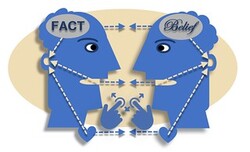 Subjects were interviewed after completing the exercise and asked why they had rated themselves as they had. The more capable students, who found the tests easiest, tended to think that their peers would also find the tests easy, so they had ranked themselves lower. Conversely, the poorer performing students, who had found the tests difficult, assumed their peers would also find the tests difficult and ranked themselves higher. This betrayed an internal bias. Poor performing students overrated their own performance, while better performing students overrated the performances of their peers. Even after providing feedback, these internal biases appeared to persist. 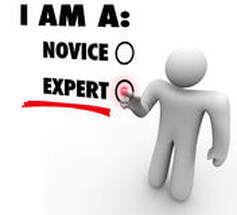 At this point I should inject a word of caution. The poorest performing students didn’t rank themselves in the highest performing bracket. So, a D grade student didn’t think they were performing as well as an A grade student. But they did assume they were performing as well or better than a C grade student. So, what has this to do with finding an agent or a publisher? Well, if we extend the Dunning-Kruger hypothesis into the world of publishing, an author who isn’t a great writer may, thanks to this internal bias, think that their work is better than it is. This will make it hard for them to understand why they are getting rejection after rejection.  On the other hand, a good writer may feel that their work isn’t as good as that of other good writers and that may discourage them from submitting their work to an agent or publisher in the first place, because they assume it will be rejected. If that is the case, is there a solution for the writer? There may be. The first thing to do is to understand that a cognitive bias actually exists and recognise the effect it might be having on our own perception of ourselves. We need to actually ask if we are as good (or as poor) as we think we are. And the only way to answer that question is to seek out unbiased feedback.  Many of you will already have worked out that I’m talking about beta readers. Friends and family aren’t good beta readers, because they don’t want to hurt the author’s feelings. They would tell William McGonagall* that his poetry is great if he was a friend or relative. This means that if an author wants honest feedback on their work, the beta reader must be a stranger, so that they can provide feedback that is free of any bias caused by emotional involvement. But there is a trap here that many authors – and beta readers – aren’t aware of. While a beta reader may start off being an unbiased stranger, that relationship changes over time. Authors want the best feedback, so they will nurture a valued beta reader and use them again and again. But the beta reader is bound to have an emotional response to that nurturing and that may affect the nature of their feedback. In other words, they may develop an emotional bond with the author which could classify them as a friend, thereby losing the independent viewpoint that made them so valuable in the first place. You might think of it as the Catch-22 of beta reading. If you are starting to think of a beta reader as a friend, then they have lost their value, but not treating them as a friend risks losing them. Ideally an author will find new beta readers for each new work. But that means a lot of work identifying and cultivating them, only to have to do it all over again for the next book and the next. 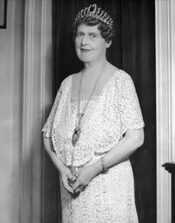 Florence Foster Jenkins Florence Foster Jenkins But being aware that the trap exist in the first place is a good first step. Be aware that the beta reader may want you to like them almost as much as you want them to like your work. As soon as you have exchanged email addresses, an emotional bond is starting to form, so it is necessary for both authors and beta readers to try to maintain an “arm’s length” relationship. However, having independent feedback is no use if you don't respond to it. Your beta readers have given you feedback - use it to improve your work. If you ignore it because it isn't what you want to hear, you have fallen into another trap and the Dunning-Kruger effect even predicts that trap because it identified that subjects often didn't respond to feedback on their performance. Who knows, you may improve your work enough to find an agent or a publisher. * William McGonagall (1825-1902) was a Scottish poet whose poems were so bad that he became famous. People paid to see him read his poems for the comedy value (his work was quite serious in its subject matter). McGonagall, however, was deluded enough to interpret that as evidence of his genius. See also Florence Foster Jenkins. If you have enjoyed this blog or found it informative, why not make sure you don't miss future editions by signing up for our newsletter. Just click the button below. We promise not to spam you and you can unsubscribe at any time. |
AuthorThis blog is compiled and curated by the Selfishgenie publishing team. Archives
June 2025
|

 RSS Feed
RSS Feed